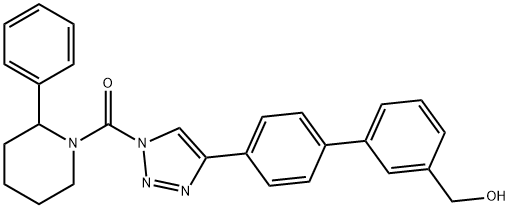Description
KT182 is a potent inhibitor of α/β-hydrolase domain-containing protein 6 (ABHD6) with IC50 values of 1.7, 15.1, and 0.24 nM using Neuro2a membrane proteomes, recombinant ABHD6 in HEK293T cells, and Neuro2a cells in situ, respectively. Following administration of KT182 (1 mg/kg, i.p.) in mice, ABHD6 is inactivated in liver and brain extracts, suggesting that it is brain-penetrant, unlike the closely related compound KT203 .
Uses
KT182 is a potent and selective inhibitor of α/β-hydrolase domain containing 6 (ABHD6), with an IC50 of 0.24 nM in Neuro2A cells[1].
in vitro
the in-vitro potencies were tested for kt182 and the results found that kt182 could potently inhibit abhd6 as measured by gelbased competitive abpp and 2-ag hydrolysis assays. moreover, the in-situ potencies were measured by treating neuro2a cells with varying concentrations of kt182 for 4 h, and it was found that kt182 could inhibit abhd6 with ic50 values in the subnanomolar range [1].
in vivo
in animal study, mice were treated intraperitoneally with kt182 at various doses (0.1-1 mg/kg) for 4 h, and the results found that kt182 could produce near-complete blockade of abhd6 in the liver at the highest dose tested. moreover, kt182 at lower doses maintained around 80% inhibition of abhd6 in the liver and kt182 at higher doses showed impressive selectivity in the mouse liver, exhibiting little cross-reactivity against the numerous carboxylesterase enzymes. in addition, kt182 could also completely inactivate abhd6 in the mouse brain at 1 mg/kg [1].
References
[1] hsu kl, tsuboi k, chang jw, whitby lr, speers ae, pugh h, cravatt bf. discovery and optimization of piperidyl-1,2,3-triazole ureas as potent, selective, and in vivo-active inhibitors of α/β-hydrolase domain containing 6 (abhd6). j med chem. 2013 nov 14;56(21):8270-9.
